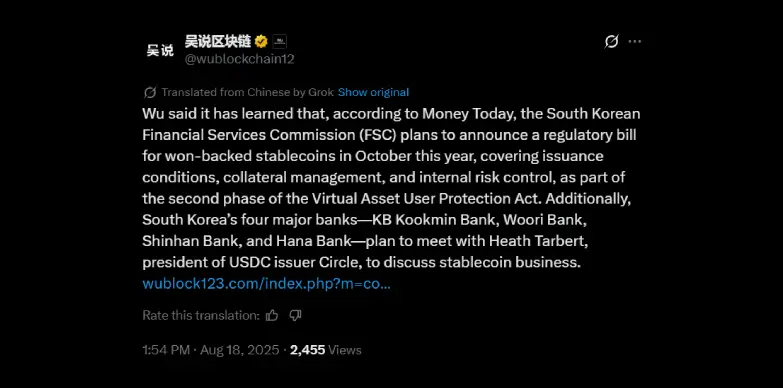Stablecoin Regulations to Launch in South Korea This October

Key Highlights:
- South Korea’s FSC will announce stringent regulations for won-backed stablecoins in October.
- Four major banks will meet with Circle president Heath Tarbert to explore stablecoin business opportunities.
- The move is a part of the second phase of the Virtual Asset User Protection Act.
South Korea has decided to introduce comprehensive regulations for won-backed stablecoins that will be rolled out by October 2025. The Financial Services Commission (FSC), the nation’s chief financial regulatory authority, has also revealed that these rules will be an important part of the second phase of the Virtual Asset User Protection Act, a legislative framework that is designed to safeguard users and bring greater clarity to the ever changing world of crypto.

Details of the Upcoming Stablecoin Regulatory Bill
As per the recent revelation, the FSC’s bill will be addressing three main issues that are crucial for safe and transparent operation of won-pegged stablecoins. They have been listed below:
- Issuance Requirement: The bill be responsible for defining entities that are authorized to issue stablecoins and the district conditions they must meet. With this, FSC aims to remove unregulated and non-compliant crypto players and want to make sure that only well-capitalized and credible organizations are allowed to participate in the sector.
- Collateral Management: Stablecoin issuers will be required to follow strict rules to make sure that there is a proper safeguarding of the won reserve backing their tokens, as well as sound management of their operations. This includes requirements for transparent reporting, periodic audits, and robust asset custody arrangements, addressing systemic risks revealed by past failures of under-collateralized cryptocurrencies.
- Internal Risk Controls: The law will also require issuers to implement internal control mechanisms to make sure that there are minimal operational risks and enforce compliance with anti-money laundering and consumer protection mandates.
This laying down of frameworks indicate that the South Korean government now recognizes the role of stablecoins in digital economy, and it also understands the systemic risks that can arise without proper rules and regulations in place. The FSC’s goal is not only to protect end users but it also includes instilling global confidence in the Korean digital asset market.
Why Are These Regulations Being Incorporated Now?
Stablecoins, which are pegged to a fiat currency like US dollar and Korean won, usually offers a better stability when compared to the conventional cryptocurrencies. The adoption of stablecoins has soared over the years, and it is mainly fueled by their use in digital payments, cross-border transactions, and as a gateway into other digital assets. On the flip side, the market has also seen notable collapses and fraud cases, spurring urgent call for stronger regulatory oversight. South Korea’s proactive approach follows global trends, but is particularly pressing as the local popularity of digital assets and President Lee Jae-myung’s pro-innovation agenda.
Bank Participation and Global Collaboration
In this development, the country’s four largest banks, KB Kookmin Bank, Shinhan Bank, Woori Bank and Hana Bank will hold high-level talks with Heath Tarbert, president of Circle Internet Financial (the issuer of major US dollar-backed stablecoin, USDC). These meetings, scheduled to coincide with Tarbert’s visit to Seoul are being seen as pivotal for two reasons:
- Integration of Stablecoins into Mainstream Finance: These four banks are expected to discuss strategies for leveraging Circle’s USDC in South Korean cross-border settlement systems. Moreover, the possibility of launching a won-backed variant in partnership with Circle will also be explored.
- Aligning with Regulatory Changes: With stablecoin regulations imminent, the banks are keen to make sure that any product that is launched is fully compliant with the new FSC requirements. They have signed nondisclosure agreements, indicating the strategic importance and confidentiality of the discussions.
Also Read: Norway Wealth Fund Boosts Bitcoin Stake 192% to 7,161 BTC


